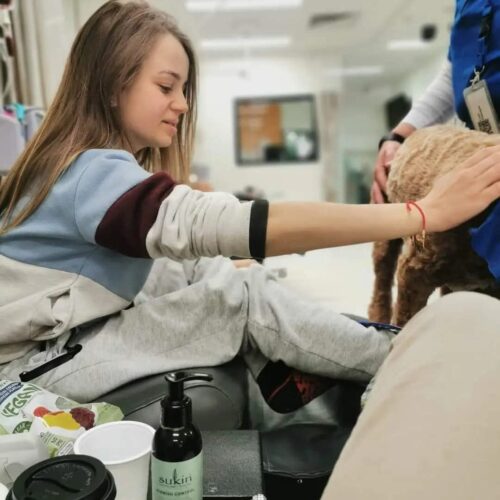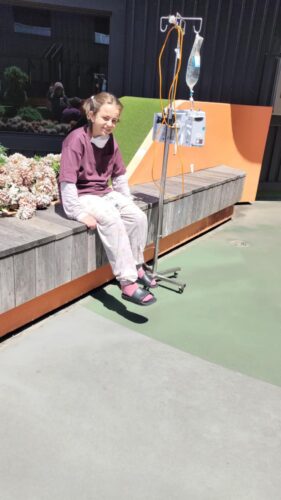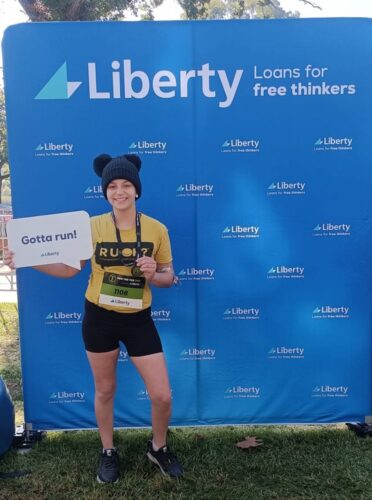The Diagnosis: A Shocking Beginning 
My journey with lymphoma started in August 2022, when I began experiencing symptoms that just didn’t feel right. I went to the GP with enlarged lymph nodes, itchy skin, weight loss, night sweats, and constant fatigue. My doctor immediately suspected something serious and referred me to Peter MacCallum Cancer Centre for further testing. A short time later, I was given the devastating news: I had Peripheral T Cell Lymphoma – Not otherwise specified (PTCL-NOS).
At the time of my diagnosis, I was 25 years old. When the GP told me, I felt relieved and validated that the symptoms I was experiencing weren’t in my head – they were real. I felt that now I had a diagnosis, I could start the process of treating it and feeling better.
Treatment: A Long and Tough Road
The treatment I underwent was intense and, at times, really tough. I’ve had several rounds of chemotherapy, including BV-CHP, Pralatrexate, Romidepsin, GDP, HYPER CVAD-B, Bendamustine and Lenolidomide. I also participated in clinical trials like AZD4573, GEN3017 and DREN BIO-01. The trials weren’t too difficult, and I’d recommend them. But the hardest parts of my treatment were the allogeneic transplant and radiation. Radiation left me with burnt skin, fatigue, and mouth sores. It was brutal, but it was necessary for my recovery.
Balancing Life and Treatment
One of the biggest challenges I faced throughout this journey was financial. I had to work throughout my treatment to support myself. Balancing my health with my financial needs was tough, but I had to do it. It wasn’t easy, but working helped me focus on something other than treatment and cancer which was good for my mental health. I had the privilege of caring for other cancer patients and stem cell transplant recipients .
Support: The Nurses Who Made a Difference
The lymphoma care nurse at the hospital positively impacted my treatment experience. She linked me in with Adolescent and Young Adult Services, checked in on me during treatments, and was always on call to answer any of my questions.
The clinical trial nurses were especially important during my journey. They attended every clinical trial appointment with me and were always available to provide reassurance. The trials had difficult moments, but their kindness made a difference. One of them even brought me my favourite coffee order while I was admitted to the hospital. Over time, these nurses became like family—I saw them every week, and we shared our lives and stories.
I even celebrated two birthdays in the clinical trial unit. The nurses all got together to sing me Happy Birthday and share a piece of cake. Moments like these reminded me that I wasn’t just another patient to them—they genuinely cared.
Finding Lymphoma Australia
I didn’t have to relocate for treatment, but the emotional and mental toll was hard to bear. During this time, I searched for support and found Lymphoma Australia online. I came across their resources, including the treatment pack, which was incredibly helpful. I received the treatment pack and have been part of the face-to-face and online support groups. The online resources on their website were a huge benefit to me, helping me understand more about my condition and how to cope with the treatment. Connecting with others who were going through the same thing made me realise I wasn’t alone.
 The lymphoma care nurse at Lymphoma Australia facilitated the lymphoma support group at Peter Mac, where I had the chance to connect with other patients and share my story. Having that network of support made an enormous difference.
The lymphoma care nurse at Lymphoma Australia facilitated the lymphoma support group at Peter Mac, where I had the chance to connect with other patients and share my story. Having that network of support made an enormous difference.
The Lymphoma Down Under page on Facebook also became an essential part of my support network. It’s a space where people with lymphoma can ask questions, share experiences, and give advice. It was so comforting to see others going through similar struggles, and I’ve learned a lot from their stories.
Advice: What I Wish I’d Known
If I could offer one piece of advice to someone who’s recently been diagnosed with lymphoma, it would be this: ask your doctor as many questions as you need to and don’t be afraid to get a second opinion. The more you know, the better prepared you’ll be.
Moving Forward: Staying Strong
Looking back, I feel so grateful for the resources and support I received from Lymphoma Australia. Their website was filled with helpful information, and the support groups—both online and face-to-face—were incredible. It’s been a huge help in my journey.
As I continue to recover from my allogeneic transplant, I remain hopeful. I’m sharing my story in the hopes that it can offer some comfort and guidance to others going through similar experiences. I want people to know that they don’t have to face lymphoma alone. Stay strong, stay informed, and remember that you are not alone in this.